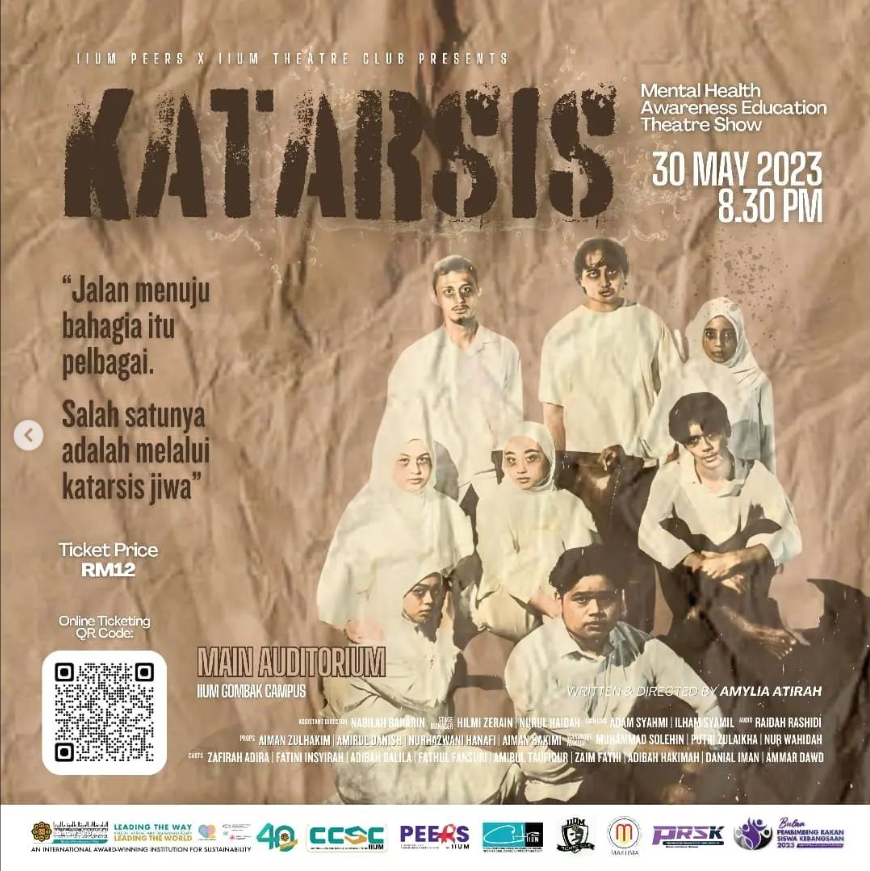By Aiman Zhafran
A product from the same producer of the theatre performance “Narcissary” in the previous semester, the counselling support group, PEERS IIUM, in collaboration with the IIUM Theatre Club came up with the edifying educational play “Katarsis”. It was performed at the Main Auditorium, IIUM Gombak, on 30 May 2023.
“Katarsis” is a play that was centered on the main character, Nadirah, (played by Zafirah Adira), a Graphic Designer with a troubled past and equally troubled secret as the latter was slowly revealed at the end of the play. The play had six scenes packed with much thoughtful dialogue layered with puns and moments of humor. “Katarsis” subverted the audiences expectations of the characters, revealing them with hilarity.
Written and directed by Amylia Athirah and featuring a concise yet interesting ensemble of characters, “Katarsis” explored the themes of mental health conditions such as attention-deficit hyperactivity disorder (ADHD) and schizophrenia, psychiatric help and titular catharsis, which was mentioned as the goal of every Psychiatrist and Counsellor. It was mentioned explicitly in the first scene that catharsis, or the purging of strong or repressed emotions, is the goal of every mental health worker, so the patient may find and make peace with their feelings and thoughts.Â
Plotwise, the play followed two different timelines, one of a dysfunctional family with an abusive father Zul (played by Zaim Fathi), the acquiescent mother Azlin (performed by Adibah Kahar), and the rebellious daughter Elyana (played by Fatini Insyirah). The other timeline is that of Nadirahs interaction with her friends; husband and wife, Alam (played by Fathul Fansuri) and Suhaila (acted by Adiba Dalila), the former, a Psychiatrist and the latter a school Counsellor. Much of the plot took place in a cafe, where Nadirah met Elyana and friends, Adam and Suhaila on separate occasions.
There was also a subplot with the staff of the cafe in the play, Abang Joe (acted by Danial Iman), a concerned yet uninformed older brother to ADHD-diagnosed Fakri (performed by Ammar Dawd), that was solved with the aid of Suhaila together with a student named Siti, in scene four.
In scene five, it was revealed that the first of the aforementioned timelines were recounts of Nadirahs past, when her abusive father caused the death of her mother and sister, that was projected into the present with the character of Elyana. She was then exposed at the time to have been diagnosed and in treatment for schizophrenia. This was foreshadowed by her friends noticing the prescription pills which accidentally fell from her bag and later represented by the character of Bayang, who tormented her, accusing her of being a murderer for leaving her mother and sister to the mercy of her fathers abusive wrath.
The climax of the play came with the aforementioned revelation, as Elyana rushed on stage, followed by her mother Azlin and her father, Zul, but only Nadirah can see them while the other characters were bewildered at what she could possibly see.
The play ended with the eventual treatment of Nadirah and the explanation of schizophrenia, in which Nadirah made peace with her past and the audience was informed that to achieve catharsis, help must be sought, with complete disregard to social stigma or stereotypes.
On the more technical scale of the theatrical performance, the actors gave their all with their roles, with remarkable energy and exceptional charisma emanating from the stage. Notable performances included Zaim Fathi as Zul, with his booming voice and commitment to his role, Amirul Atar as Bayang, maniacally laughing and riveting the audiences attention onstage, and Zafirah Adira as Nadirah displaying the torment and pain of bearing the weight of a troubled past, alone.
It was impressive to see the lighting cues, cleverly employed to show what emotions should be felt by the audience and setting the overall tone of a scene. The masterful minimalist use of props as elements for all of the scenes, required little to no movement of props should also be noted, as there were no prop masters needed to move the items onstage, with smooth transitions between one scene to another.
All in all, in my experience, the play was a brilliant piece of didactic theatrics, with excellent attempts at subverting the audiences expectations who were caught in episodes of disbelief. The acting was fabulous, with exceptional energy despite the plays depressive tone, and theatrical elements such as lighting and props did well to set the tone and mood of the play. The number of people in the audience was also staggering, with the night having a full house of audiences. Congratulations to the team and the writer for the extraordinary effort and may there be more plays of comparable quality in the coming semesters insyaAllah.***
